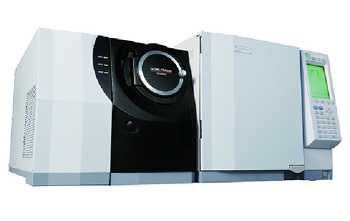The number of chemical substances that can harm the environment continues to increase. Chemists need to measure these contaminants quickly and accurately, but sample pretreatment and interference from complex matrices can be problematic.
 Shimadzu’s new GCMS-TQ8030 triple quadrupole gas chromatograph mass spectrometer.
Shimadzu’s new GCMS-TQ8030 triple quadrupole gas chromatograph mass spectrometer.
Shimadzu's new GCMS-TQ8030 triple quadrupole gas chromatograph mass spectrometer offers a solution to these challenges along with the speed, accuracy and ease of operation that scientists want.
With Shimadzu's high-efficiency proprietary ion source, the GCMS-TQ8030 achieves the highest sensitivity specification in its class for multiple reaction monitoring (MRM) measurements by GC/MS/MS, as well as for scan and SIM measurements by GC/MS. The instrument's high-sensitivity analysis allows a wide variety of measurement modes, including MRM, scan, combination scan/MRM, neutral loss scan and others.
The GCMS-TQ8030 features Shimadzu's UFsweeper technology, which minimizes collision cell length and provides high-CID efficiency and high ion transport speed. UFsweeper accelerates ions out of the collision cell by forming a
pseudo-potential surface, preventing any drop in signal intensity or cross talk, even at ultra-fast measurement speeds.
The system comes equipped with Advanced Scanning Speed Protocol (ASSP), an internal protocol that optimizes ion transmission parameters during the scan acquisition process. Scan speeds of up to 20,000 u/sec and high-speed MRM measurements (600 transitions/sec) facilitated by UFsweeper make high-speed MRM acquisition possible.
The GCMS-TQ8030 comes equipped with an Ecology mode that reduces the power consumed in analysis standby mode by 36 percent. Ecology mode eliminates unnecessary power consumption by the GC, MS and PC, and it also decreases the consumption of carrier gas. When used over one year of operation, Ecology mode reduces power consumption by 26 percent and carbon dioxide emissions by about 1.1 tons.
Other features of the GCMS-TQ8030 include:
- Twin line MS system eliminates need to swap columns;
- Automatic adjustment of retention time (AART) function easily adjusts retention times and MRM event times;
- Electron, chemical and negative chemical ionization available;
- Easy sTop, which enables users to perform maintenance on the injection port without venting the MS, for drastic reduction of maintenance time; and
- GCMSsolution (analysis, browser and post-run analysis programs).